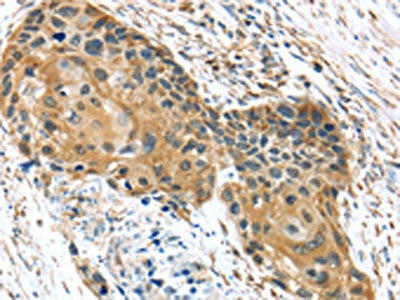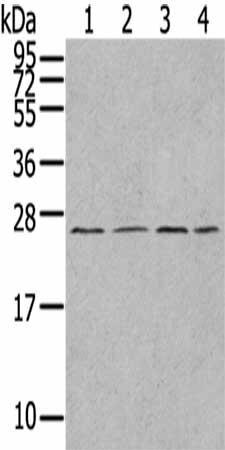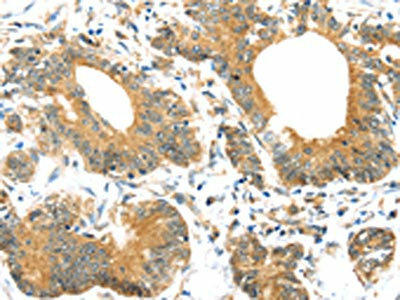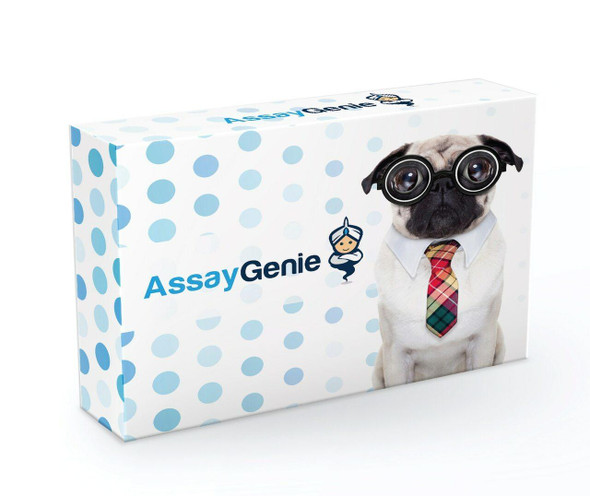UBTD1 Antibody (PACO20809)
- SKU:
- PACO20809
- Product Type:
- Antibody
- Reactivity:
- Human
- Mouse
- Rat
- Host Species:
- Rabbit
- Isotype:
- IgG
- Applications:
- ELISA
- WB
- IHC
- Antibody Type:
- Polyclonal Antibody
- Conjugation:
- Unconjugated
Frequently bought together:
Description
| Antibody Name: | UBTD1 Antibody (PACO20809) |
| Antibody SKU: | PACO20809 |
| Size: | 50ul |
| Host Species: | Rabbit |
| Tested Applications: | ELISA, WB, IHC |
| Recommended Dilutions: | ELISA:1:1000-1:2000, WB:1:200-1:1000, IHC:1:25-1:100 |
| Species Reactivity: | Human, Mouse, Rat |
| Immunogen: | Synthetic peptide of human UBTD1 |
| Form: | Liquid |
| Storage Buffer: | -20°C, pH7.4 PBS, 0.05% NaN3, 40% Glycerol |
| Purification Method: | Antigen affinity purification |
| Clonality: | Polyclonal |
| Isotype: | IgG |
| Conjugate: | Non-conjugated |
 | The image on the left is immunohistochemistry of paraffin-embedded Human esophagus cancer tissue using PACO20809(UBTD1 Antibody) at dilution 1/30, on the right is treated with synthetic peptide. (Original magnification: x200). |
 | Gel: 12%SDS-PAGE,Lysate: 40 µg,Lane 1-4: A549 cells, Jurkat cells, A375 cells, HepG2 cells,Primary antibody: PACO20809(UBTD1 Antibody) at dilution 1/300 dilution,Secondary antibody: Goat anti rabbit IgG at 1/8000 dilution,Exposure time: 1 minute. |
 | The image on the left is immunohistochemistry of paraffin-embedded Human colorectal cancer tissue using PACO20809(UBTD1 Antibody) at dilution 1/30, on the right is treated with synthetic peptide. (Original magnification: x200). |
| Background: | The degradation of many proteins is carried out by the ubiquitin pathway in which proteins are targeted for degradation by covalent conjugation of the polypeptide ubiquitin. This gene encodes a protein that belongs to the ubiquitin family of proteins. The encoded protein is thought to regulate E2 ubiquitin conjugating enzymes belonging to the UBE2D family. |
| Synonyms: | ubiquitin domain containing 1 |
| UniProt Protein Function: | UBTD1: Chromosomal Location of Human Ortholog: 10q24.2Molecular Function: protein binding |
| UniProt Protein Details: | |
| NCBI Summary: | The degradation of many proteins is carried out by the ubiquitin pathway in which proteins are targeted for degradation by covalent conjugation of the polypeptide ubiquitin. This gene encodes a protein that belongs to the ubiquitin family of proteins. The encoded protein is thought to regulate E2 ubiquitin conjugating enzymes belonging to the UBE2D family. [provided by RefSeq, Mar 2014] |
| UniProt Code: | Q9HAC8 |
| NCBI GenInfo Identifier: | 74752759 |
| NCBI Gene ID: | 80019 |
| NCBI Accession: | Q9HAC8.1 |
| UniProt Secondary Accession: | Q9HAC8,Q53HI3, D3DR57 |
| UniProt Related Accession: | Q9HAC8 |
| Molecular Weight: | 25,938 Da |
| NCBI Full Name: | Ubiquitin domain-containing protein 1 |
| NCBI Synonym Full Names: | ubiquitin domain containing 1 |
| NCBI Official Symbol: | UBTD1 |
| NCBI Official Synonym Symbols: | |
| NCBI Protein Information: | ubiquitin domain-containing protein 1 |
| UniProt Protein Name: | Ubiquitin domain-containing protein 1 |
| UniProt Synonym Protein Names: | |
| Protein Family: | Ubiquitin domain-containing protein |
| UniProt Gene Name: | UBTD1 |
| UniProt Entry Name: | UBTD1_HUMAN |
| Antibodies |
| UBTD1 Antibody (PACO05389) |
| Secondary Antibody |
| Anti-HRP Goat Anti-Rabbit IgG (H+L) Antibody (CABS014) |
| Recommended Products |
| Anti-FITC Goat Anti-Rabbit IgG (H+L) Antibody (CABS011) |
| Anti-HRP-conjugated Beta Actin Antibody (CABC028) |









